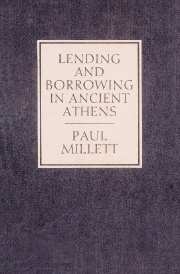Book contents
- Frontmatter
- Contents
- Preface
- I Approaches to lending and borrowing
- II The ideology of lending and borrowing
- III Borrowing and repayment
- IV The rôle of interest
- V Philia and friendship
- VI Non-professional lending: loans without interest
- VII Non-professional lending: loans bearing interest
- VIII Professional money-lending
- IX Conclusion
- Appendices
- Notes
- Bibliography
- Index of passages cited
- Index of papyri
- Index of inscriptions
- General index
V - Philia and friendship
Published online by Cambridge University Press: 20 August 2009
- Frontmatter
- Contents
- Preface
- I Approaches to lending and borrowing
- II The ideology of lending and borrowing
- III Borrowing and repayment
- IV The rôle of interest
- V Philia and friendship
- VI Non-professional lending: loans without interest
- VII Non-professional lending: loans bearing interest
- VIII Professional money-lending
- IX Conclusion
- Appendices
- Notes
- Bibliography
- Index of passages cited
- Index of papyri
- Index of inscriptions
- General index
Summary
ARISTOTLE ON FRIENDSHIP
At the heart of Aristotle's analysis of philia or ‘friendship’ in his Nicomachean Ethics is an extended discussion of the differing obligations owed to the different varieties of philoi (1165a14–35):
Clearly, then, we should not make the same return (apodoteon) to everyone, and we should not give our fathers everything, just as we should not make all sacrifices to Zeus. And since different things should be assigned (aponemēteon) to parents, brothers, comrades (hetairois) and benefactors (euergetais), we should accord to each what is appropriate and fitting (taoikeia kai ta harmottonta). This is what actually appears to be done: blood relations (tous sungeneis) are the people invited to a wedding, since they share the same family (koinon to genos), and hence share in actions that concern it; and for the same reason, it is thought that relations more than anyone must come to funerals.
It seems that we must supply the means of support (trophēs) to parents more than anyone. For we suppose that we owe them this (hōs opheilontas), and that it is finer to supply those who are the cause of our being than to supply ourselves in this way. And we should accord honour to our parents, just as we should to the gods, but not every sort of honour; for we should not accord the same honour to a father and to a mother, nor accord them the honour due to a wise person or a commander. We should accord a father's honour to a father, and likewise a mother's to a mother.
- Type
- Chapter
- Information
- Lending and Borrowing in Ancient Athens , pp. 109 - 126Publisher: Cambridge University PressPrint publication year: 1991



